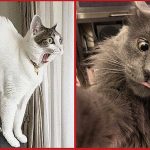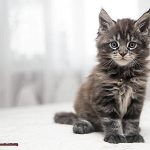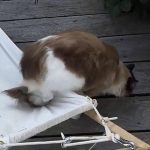Are you tired of constantly cleaning up after your elderly cat’s never-ending vomit sessions? Do you find yourself wondering why your beloved feline friend can’t seem to keep their food down? Well, fear not, dear pet parent. You’re not alone in this struggle.
It’s a common issue that many cat owners face with their senior pets. Unfortunately, it’s also one that they tend to overlook. But don’t worry, we’re here to help shed some light on the matter. There are several reasons why your cat may be throwing up all the time, and it’s important to understand them to provide the best care for your furry companion.
One possible cause is a gastrointestinal problem like inflammatory bowel disease or pancreatitis. Other factors that could contribute to vomiting in elderly cats include food intolerances, allergies, medication side effects, or underlying health issues. Additionally, some cats have a habit of eating too quickly, which can lead to choking and vomiting.

In this blog post, we’ll dive deeper into the reasons behind your elderly cat’s constant vomiting and offer tips on how you can alleviate this issue. From adjusting their diet and observing their feeding habits to scheduling a visit with the vet – we’ve got you covered. So grab your cat-person hat and let’s get started on finding solutions for your furry friend’s upset tummy.
What Causes Cats to Vomit?
If you notice that your elderly cat is vomiting frequently, it could be a cause for concern. Several factors can contribute to vomiting in cats, including hairballs, overeating, food allergies, and underlying illnesses.
Hairballs are one of the most common culprits of vomiting in cats. While cats groom themselves with their barbed tongues, they end up ingesting a lot of hair. When this hair accumulates in their stomachs, it can cause irritation and lead to vomiting. While occasional hairballs are normal, if your cat is vomiting up hairballs frequently, it may be time to consult with your veterinarian.
Another common cause of vomiting in cats is overeating. When cats eat too much food or eat too quickly, their stomachs may struggle to digest everything. This can cause discomfort and trigger vomiting. To avoid overeating, it’s essential to monitor your cat’s feeding habits and adjust their portions accordingly.
Food allergies can also be a potential cause of vomiting in cats. Like humans, cats can develop allergies to certain types of food like dairy products, beef, and fish. If you suspect your cat has a food allergy, it’s best to consult with your veterinarian to determine the best course of action.
As cats age, their digestive system becomes less efficient, making it harder for them to digest their food properly. This can lead to gastrointestinal issues and a buildup of undigested food in their stomachs, resulting in frequent vomiting.
Underlying illnesses such as kidney disease or hyperthyroidism can also cause vomiting in cats. If you notice any changes in your cat’s behavior or they are vomiting frequently, it’s essential to take them to the vet for a check-up. The vet may recommend further tests or prescribe medication if necessary.
Hairballs as a Cause of Vomiting in Elderly Cats
This is a common problem in cats of all ages, but it can be particularly troublesome for senior felines. As an expert on the topic, I’m here to offer some tips on how to prevent hairballs from forming and causing vomiting in elderly cats.
First and foremost, it’s important to understand what hairballs are and why they occur. When a cat grooms itself, loose fur can accumulate in the stomach and intestines. In small amounts, this hair can pass through the digestive system without issue. However, when larger amounts of hair accumulate, they can form into a ball-like mass that does not pass through easily. This can cause discomfort and irritation in the stomach lining and trigger vomiting.
As cats age, their digestive systems may become less efficient at processing hair and other ingested materials, leading to more frequent and severe hairballs. But fear not. By taking steps to prevent hairball formation, cat owners can help keep their furry friends healthy and comfortable in their golden years.
One of the most effective methods for preventing hairballs is regular grooming. Daily brushing can help remove loose fur from your cat’s coat before it is ingested during grooming. Not only does this reduce the amount of hair that accumulates in your cat’s stomach, but it also has the added benefit of strengthening your bond with your feline friend.
In addition to grooming, feeding your cat a specialized diet that is designed to reduce hairball formation is another option. These types of diets typically contain additional fiber or other ingredients that help move ingested hair through the digestive system. Talk to your veterinarian about choosing the best diet for your cat’s individual needs.
If you’re looking for additional preventive measures, there are several over-the-counter products that can help prevent hairball formation in cats. These products include gels or pastes that are designed to lubricate the digestive tract and make it easier for hair to pass through. Some products also contain enzymes that break down hair and other materials in the digestive system.
It’s important to note that while occasional vomiting is normal for cats, frequent episodes should prompt a visit to the veterinarian to ensure your feline friend is healthy and happy. Hairballs in elderly cats can also lead to other health issues, such as constipation or intestinal blockages. By taking steps to reduce the likelihood of hairball formation, cat owners can help prevent these more serious health problems from occurring.
Gastrointestinal Issues as a Cause of Vomiting in Elderly Cats
As our feline friends age, their digestive system becomes less efficient, making them more prone to gastrointestinal issues that can cause vomiting. The weakening of the muscles in the stomach and intestines may lead to constipation, diarrhea, and chronic vomiting.
Inflammatory bowel disease (IBD) is a common gastrointestinal issue in senior cats. This condition occurs when the immune system attacks the lining of the digestive tract, causing inflammation and chronic vomiting. Cats with IBD may also experience diarrhea, weight loss, and a decrease in appetite.
Gastrointestinal cancer is another possible cause of vomiting in elderly cats. Tumors in the stomach or intestines can cause chronic vomiting, diarrhea, and weight loss. If you notice any unusual changes in your cat’s eating habits or bowel movements, it’s crucial to seek veterinary care.

Other potential causes of vomiting in senior cats include food allergies or sensitivities, foreign objects or hairballs in the digestive tract, and infections or parasites. Regular grooming and proper nutrition can help prevent hairballs and other digestive issues.
It’s important to note that while occasional vomiting may be normal for cats, frequent or chronic vomiting should always be evaluated by a veterinarian. Your vet can help identify the underlying cause of your cat’s vomiting and recommend appropriate treatment options to improve their overall health and quality of life.
Kidney Disease as a Potential Cause of Vomiting in Elderly Cats
If you have an elderly cat, and they start vomiting more frequently than usual, it may be a sign of a more serious condition, such as kidney disease.
Kidney disease is a prevalent ailment in elderly cats, as the kidneys are responsible for filtering waste products from the blood and removing them from the body through urine. When the kidneys become damaged or diseased, they are unable to function properly, leading to a buildup of toxins in the bloodstream. This can cause nausea and vomiting in cats.
If you suspect your elderly cat is suffering from kidney disease, it’s crucial to take them to a veterinarian for an accurate diagnosis. Your vet may perform blood and urine tests to evaluate kidney function and identify any other underlying health issues that may be causing vomiting.
Symptoms of kidney disease in cats include increased thirst and urination, weight loss, lethargy, and poor appetite. Vomiting can also be a sign of this condition. Therefore, it is essential to pay attention to these signs and seek immediate veterinary care.
Once diagnosed with kidney disease, your vet may recommend dietary changes, medication, and fluid therapy to help manage the condition. In some cases, surgery may be required to remove damaged tissue or tumors from the kidneys.
It’s crucial to follow your vet’s treatment plan closely and monitor your cat’s condition regularly for any changes. With proper diagnosis and treatment, many cats with kidney disease can continue to live happy and healthy lives.
Liver Disease as a Possible Cause of Vomiting in Elderly Cats
As our feline friends grow older, they become more susceptible to various health issues, including liver disease. Liver disease in elderly cats can cause vomiting, which is a clear indication that something is not right. As an expert on this topic, I am here to help you understand how different types of liver disease can be the culprit behind vomiting in elderly cats.
One of the most common types of liver disease in cats is hepatic lipidosis or fatty liver disease. This condition is prevalent in overweight cats and can occur due to rapid weight loss or malnutrition. If you notice that your cat has lost a lot of weight suddenly and is vomiting frequently, it could be a sign of hepatic lipidosis.
Another type of liver disease that can cause vomiting in elderly cats is cholangiohepatitis, an inflammation of the bile ducts and liver. This condition can be caused by an infection or immune system disorder and may also manifest as jaundice and abdominal pain in addition to vomiting. If you suspect your cat has cholangiohepatitis, it’s crucial to take them to the vet immediately.
Cirrhosis is a chronic liver disease that occurs when scar tissue replaces healthy liver tissue. This condition can be caused by alcohol abuse, infections, or toxins and can lead to vomiting, lethargy, and weight loss in elderly cats.
If you notice any signs of liver disease in your cat, such as frequent vomiting, poor appetite, or lethargy, seeking veterinary care immediately is crucial. Your vet will perform blood tests and imaging studies to diagnose the condition accurately and determine the best course of treatment.
Treatment options for liver disease in elderly cats may include medications, dietary changes, or surgery, depending on the underlying cause of the condition. With proper care and management, many cats with liver disease can continue to enjoy a high quality of life.
Thyroid Problems and Pancreatitis as Potential Causes of Vomiting in Elderly Cats
As our feline companions age, they become more susceptible to various health issues, including thyroid problems and pancreatitis. These conditions are potential causes of vomiting in elderly cats and can be serious if not promptly addressed by a veterinarian.

Hyperthyroidism is a common thyroid problem in cats that occurs when the thyroid gland produces an excessive amount of thyroid hormone. This condition can cause a range of symptoms, including weight loss, increased appetite, and vomiting. The elevated hormone levels can irritate or inflame the gastrointestinal tract, leading to vomiting. Treatment options for hyperthyroidism vary from medication to surgery or radioactive iodine therapy depending on the severity of the condition.
Pancreatitis is an inflammation of the pancreas, an organ located near the stomach. This condition can cause a range of symptoms, including vomiting, diarrhea, lethargy, and abdominal pain. In severe cases, pancreatitis can lead to dehydration and even organ failure. Treatment may involve hospitalization for supportive care, including intravenous fluids and pain management, as well as dietary changes to manage inflammation.
It’s crucial to note that frequent vomiting in elderly cats should never be ignored since it may be a sign of serious underlying health conditions. Apart from thyroid problems and pancreatitis, other conditions such as kidney disease or cancer should also be considered. Seeking prompt veterinary attention is vital to identify the underlying cause and develop an appropriate treatment plan.
To improve your cat’s quality of life and ensure they receive the best possible care, it’s essential to work closely with your veterinarian in identifying the underlying cause of your cat’s vomiting. With their help, you can create a management plan tailored to your cat’s specific needs.
How to Diagnose the Problem

To diagnose the problem and get your feline friend on the road to recovery, there are several steps you can take.
Schedule a Thorough Examination
The first step is to take your cat to the vet for a comprehensive examination. During this appointment, the vet will perform a physical exam and ask questions about your cat’s behavior and symptoms. This information will help the vet determine if any diagnostic tests are necessary.
Physical Exam Details
During the physical exam, the vet will check your cat’s vital signs, including weight, temperature, heart rate, breathing, and overall condition. The veterinarian will also examine your cat’s mouth, throat, and abdomen for any abnormalities or signs of discomfort.
Diagnostic Tests
Depending on what the vet finds during the physical exam, they may recommend additional diagnostic tests. These tests could include blood work, urine tests, x-rays, or ultrasounds. These tests can help identify any underlying medical conditions or diseases that may be causing your cat to vomit.
Provide Detailed Information
It is important to provide your vet with as much information as possible about your cat’s vomiting episodes. This includes when it occurs, how often it occurs, what the vomit looks like (color, texture), and if there are any other accompanying symptoms (such as diarrhea or loss of appetite). The more detailed information you can provide, the easier it will be for the vet to make an accurate diagnosis.
Common Causes
There are many potential reasons why an elderly cat may vomit frequently. Some of the most common causes include hairballs, food allergies, intestinal parasites, kidney disease, liver disease, hyperthyroidism, and cancer. Depending on the cause of vomiting in your cat, treatment options may vary widely.
Treating the Underlying Cause
But don’t fret just yet. Before you jump to conclusions, it’s important to take your elderly cat to the veterinarian for a thorough examination to identify the underlying cause of their vomiting. Once the root cause has been identified, treating it is paramount to the overall health and well-being of your furry friend.
There are several common causes of vomiting in older cats, including kidney disease, hyperthyroidism, and gastrointestinal issues. Let’s explore each of these in more detail:
- Kidney disease: If your cat has been diagnosed with this condition, it’s crucial to work closely with your veterinarian. They may recommend changes to your cat’s diet, medications to manage symptoms, and regular check-ups to monitor their kidney function.
- Hyperthyroidism: This condition occurs when the thyroid gland produces too much thyroid hormone, leading to symptoms such as weight loss, increased appetite, and vomiting. Treatment options may include medication, surgery, or radiation therapy. Your vet will help determine the best course of action for your cat.
- Gastrointestinal issues: Conditions such as inflammatory bowel disease (IBD) or pancreatitis can also cause chronic vomiting in older cats. Diagnosis may be challenging and may require dietary changes, medications, or other therapies depending on the severity of the condition.
It’s important to note that environmental factors such as stress or anxiety can also contribute to chronic vomiting in older cats. Therefore, providing a calm and comfortable living environment for your cat is essential to minimize stress and anxiety.
MVndPT9seFE” >
Conclusion
In conclusion, dealing with a vomiting elderly cat can be a frustrating and worrisome experience for pet owners. While occasional vomiting is normal, chronic or frequent vomiting should not be ignored as it may indicate an underlying medical condition that requires attention. Gastrointestinal problems such as inflammatory bowel disease or pancreatitis, food intolerances or allergies, medication side effects, kidney disease, hyperthyroidism, or even eating too quickly are all potential culprits behind your cat’s constant vomiting.
It’s crucial to work closely with your veterinarian to identify the root cause of your feline friend’s upset stomach and develop an appropriate treatment plan. Depending on the severity of the condition, this may include dietary changes, medications, surgery, or radiation therapy. Regular grooming and proper nutrition can also help prevent hairballs and other digestive issues that contribute to vomiting in elderly cats.
By taking proactive steps to alleviate your furry companion’s discomfort through adjusting their diet and observing their feeding habits, scheduling regular check-ups with the vet when necessary, and providing a calm living environment free from stressors – you can help ensure that your beloved senior cat lives a happy and healthy life in their golden years.







